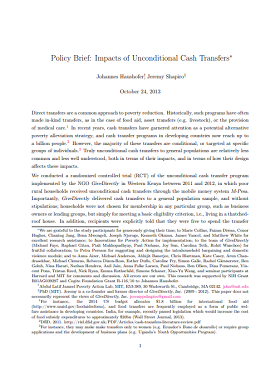Policy Brief: Impacts of Unconditional Cash Transfers
This policy paper looks at a randomized controlled trial (RCT) of the unconditional cash transfer program implemented by the NGO GiveDirectly in Western Kenya between 2011 and 2012, in which poor rural households received unconditional cash transfers through the mobile money system M-Pesa.
Importantly, GiveDirectly delivered cash transfers to a general population sample, and without stipulations; households were not chosen for membership in any particular group, such as business owners or lending groups, but simply for meeting a basic eligibility criterion, i.e., living in a thatched roof house. In addition, recipients were explicitly told that they were free to spend the transfer as they wished, without suggesting, explicitly or implicitly, that transfers should be spent in a particular fashion.
The study randomized three design features of unconditional cash transfers: whether the transfer recipient is the husband or the wife within the household, whether the transfer was made in a single a lump sum, or in nine monthly installments, and the size of the transfer (either $300 or $1,100). A broad array of outcomes and behaviors were studied, including assets, consumption, income, enterprise activity, food security, health, education, female empowerment, psychological well-being, and the stress hormone cortisol.
Data analysis followed a pre-analysis plan registered at www.socialscienceregistry.org. These and further results will be the subject of a forthcoming paper by the authors.



